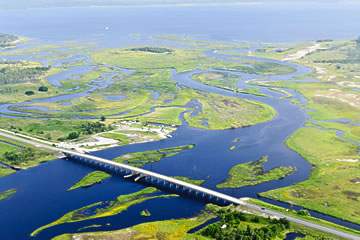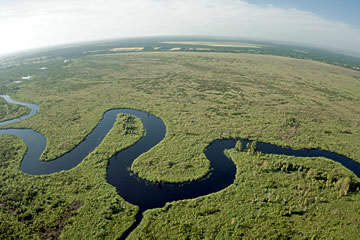Minimum Flows and Minimum Levels and Water Reservations

The St. Johns River winds and turns as it flows northward through central Florida.
Florida faces many challenges in meeting future demands for water, while maintaining healthy, natural systems. Water resources are protected through establishing and assessing minimum flows and minimum water levels (MFLs) for priority water bodies and the use of water reservations.
MFLs are established to protect water resources from significant harm that might result from excessive consumptive use. MFLs are used to inform planning decisions regarding where new water sources could be developed and in regulating water withdrawals.
Establishing MFLs
MFLs are based on the best available science. Water management districts use a variety of information to establish the point beyond which additional withdrawals would cause significant harm to water resources. Typically, MFLs undergo independent scientific peer review. Once an MFL is developed, it is adopted by rule and implemented by the districts.
Priorities for adopting MFLs are established based on the environmental, cultural and historic importance of a given water body to the state or region, and based on the potential for significant harm from existing water use and withdrawals that are planned to meet projected future needs.
Prevention, recovery and reservations

Lake Istokpoga Canal meanders through the Kissimmee River basin.
For water bodies that are below their MFLs or are projected to fall below within 20 years, water management districts are required to implement a recovery or prevention strategy to ensure the MFL is maintained.
Reservations set aside water from withdrawal as necessary for the protection of fish and wildlife or public health and safety. In many instances, the water management districts will use best available science to identify the quantity, duration and timing of water that is necessary to protect fish and wildlife. Reservations may be calculated to reflect seasonal variations in flows or levels.
The water management districts use water reservations for several purposes, such as to assist with a natural resource restoration project or as part of a recovery strategy to achieve a minimum flow and level on a water body. When a reservation is in place, the quantity of water reserved is set aside for the natural system and may not be withdrawn for human use.
MFLs Assessment
The Central Florida Water Initiative Minimum Flows and Levels and Reservations technical working group evaluates the status of existing MFLs and reservations and develops collaborative assessment measures that are applied across the CFWI area to evaluate the effect of existing and proposed water withdrawal scenarios. The working group provides a summary of the status of MFLs and MFLs-related environmental criteria for the CFWI Regional Water Supply Plan.
Resources
- Processes used by the South Florida, St. Johns River and Southwest Florida water management districts for developing priority lists for minimum flows and levels and reservations
- Standard peer review process for minimum flows and levels and water reservations within the Central Florida Water Initiative
- Central Florida Water Initiative area minimum flows and levels water body status assessment